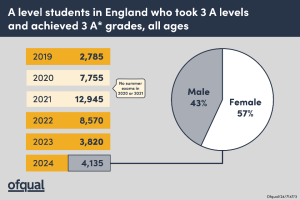
On International Women in Engineering day (23 June), EngineeringUK reports a 12% increase in the number of women working in engineering compared with 2018.The starting point was quite low, however, just 12% of the workforce in Q2 2018, compared with 14.5% in Q2 2020.
The data is taken from the Labour Force Survey Q3 2020 and shows that the 2020 figure of 906,785 women in engineering in Q2 2020 is a 25.7% increase on the Q2 2016 figure of 721,586.
Dr Hilary Leevers, chief executive of not-for-profit EngineeringUK, said: “It’s encouraging to see nearly 200,000 more women working in engineering over the last four years… Nevertheless, the fact that women represent only 14.5% of those working in engineering is a serious concern.
“Women make up half the population but we draw on such a small proportion of their talent – we, and the engineering sector as a whole, need to work harder to drive change,” she said.
The number of girls graduating with STEM degrees has generally remained steady at around 25%, according to StemWomen, a recruitment agency based in Liverpool, with the number of women graduating in core STEM subjects growing from 22,020 in 2015 to 24,705. in 2019.
In 2018, EngineeringUK published Gender disparity in engineering a briefing on female underrepresentation in the industry. The disparity is largely attributed to girls not pursuing STEM careers and dropping STEM subjects at various stages in their academic careers, despite generally performing better than boys in STEM subjects at school. The research examines the underlying reasons for female under-representation and looks at both the business case for and the barriers to getting more women in the industry.
Evidence shows gender differences in understanding of and interest in engineering as well as perceptions of self-efficacy and identity are likely to be key factors when making subject and career choices. Girls are not only less knowledgeable about engineering and how to become an engineer, but also less likely to seek careers advice from others, said EngineeringUK.
Only 60% of girls aged 11 to 14 think they could become an engineer if they wanted to, compared to 72% of boys. This drops to 53% in the 16 to 19 age range, where only a quarter of girls say they would ever consider a career in engineering.
The Gender disparity in engineering briefing contains inputs from Cummins, UCL and the Royal Academy of Engineering.
 Electronics Weekly Electronics Design & Components Tech News
Electronics Weekly Electronics Design & Components Tech News



